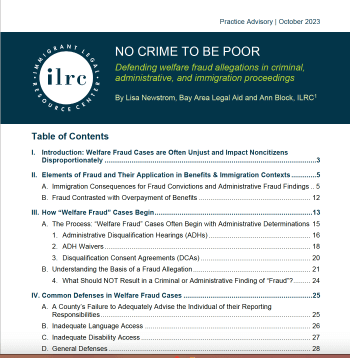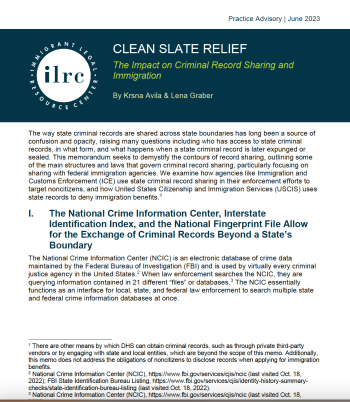Term Page
Crimes Marijuana and Immigrants
Crimes
Currently, thirty-eight states permit medical use of marijuana; twenty-three of these states fully permit recreational use; and the District of Columbia permits both uses. Still, marijuana remains on federal drug schedules and is treated for...
California Post-Conviction Relief for Immigrants: How to Use Criminal Courts to Erase the Immigration Consequences of Crimes
Crimes
Post-Conviction Relief
California Post-Conviction Relief for Immigrants: How to Use Criminal Courts to Erase the Immigration Consequences of Crimes guides advocates through how to use criminal courts to erase or mitigate the immigration consequences of convictions. This...
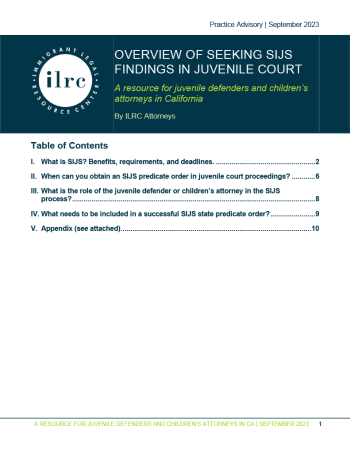
This advisory provides basic information on how to obtain the SIJS predicate order in juvenile court. It describes the benefits, requirements, and deadlines associated with SIJS, and discusses the role of the juvenile defense or children’s attorney in the process. It includes a sample SIJS predicate order from juvenile justice proceedings.
There is a new law in California that went into effect in 2023 called the California Clean Slate Act (SB 731). Under the Clean Slate Act, authorities will automatically expunge – or dismiss – certain arrests and criminal convictions. While expungement provides relief in the California state criminal legal system, it does not provide the same relief in the immigration context. This explainer walks through some key points about this new law and its implication for immigrants with prior contact with law enforcement.
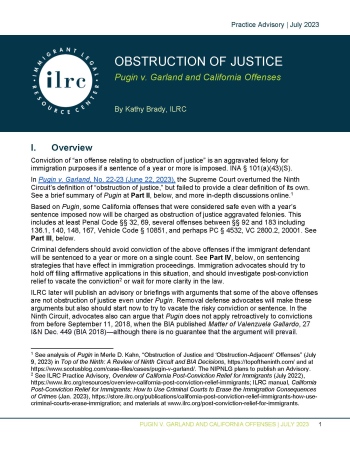
Conviction of “obstruction of justice” is an aggravated felony if a sentence of a year or more is imposed. In Pugin v. Garland, No. 22-23 (June 22, 2023), the Supreme Court overturned the Ninth Circuit’s definition of obstruction, but failed to provide a clear definition of its own. Now some California offenses are likely aggravated felonies if there is a sentence of year or more, including Penal Code §§ 32, 69, 136.1, 148, Vehicle Code § 10851, and others.
This Advisory discusses California offenses under Pugin, and discusses California criminal sentencing dispositions that avoid a sentence of a year or more for immigration purposes.
This Advisory discusses California offenses under Pugin, and discusses California criminal sentencing dispositions that avoid a sentence of a year or more for immigration purposes.
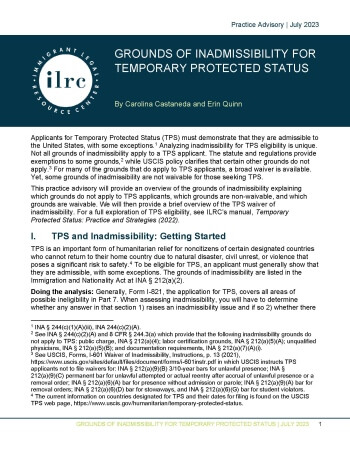
This practice advisory provides an overview of the grounds of inadmissibility for Temporary Protected Status (TPS) explaining which grounds do not apply to TPS applicants, which grounds are non-waivable, and which grounds are waivable. It also offers an overview of the TPS waiver of inadmissibility.
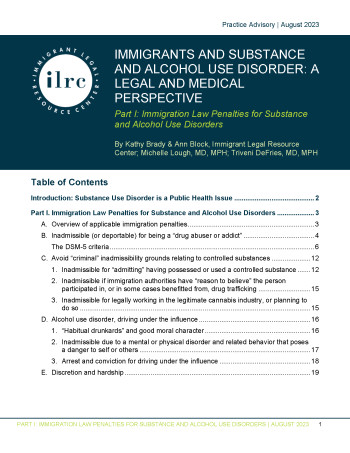
Immigration law demonizes people whom it labels as “drug abusers and addicts,” “habitual drunkards,” and “alcoholics.” The implication is that they are morally weak, dangerous, or evil. An immigrant who comes within such a category can be found inadmissible and ineligible to establish good moral character, and can be denied several forms of immigration relief as well as naturalization. But from a scientific perspective, these people suffer from a substance use disorder (SUD), a medical condition that frequently arises after the person has undergone severe trauma. Substance Use Disorder is a growing health crisis that currently affects over 20 million people in the United States.
This Advisory is written by immigration attorneys and medical doctors specializing in SUD, to examine the issue from both perspectives. Part I of the advisory discusses the several immigration law penalties based on substance use (even when use has not risen to a disorder) and suggests legal defense strategies. Part II of the advisory reviews current medical information about the disorders and discusses how this information can address questions that arise in immigration proceedings.
This Advisory is written by immigration attorneys and medical doctors specializing in SUD, to examine the issue from both perspectives. Part I of the advisory discusses the several immigration law penalties based on substance use (even when use has not risen to a disorder) and suggests legal defense strategies. Part II of the advisory reviews current medical information about the disorders and discusses how this information can address questions that arise in immigration proceedings.
An immigrant legal defense fund pays legal service providers to represent community members facing deportation in immigration court. This resource provides a general overview of immigrant legal defense funds (ILDFs) at the municipal level in Texas, including why they are needed, the goals and components of a strong ILDF, and examples of these funds from across the state.
